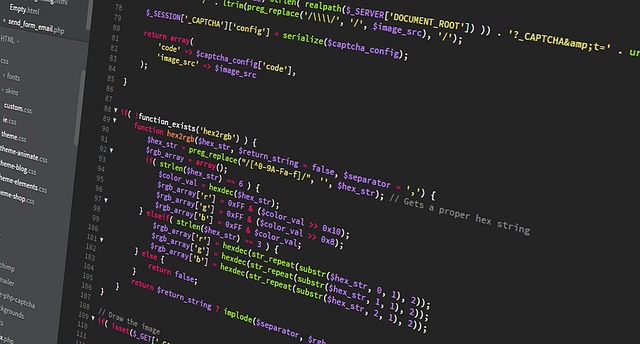What is the future of AI and machine learning in software development? How are companies leveraging these technologies to create more sophisticated software? What differentiates the companies that specialize in AI and machine learning? These are just a few of the intriguing questions that underscore the importance and innovation within the software development industry today.
The main issue lies in the current underutilization of AI and machine learning in software development. Despite a burgeoning technological landscape, many companies have yet to fully grasp the potential of these technologies. According to a 2019 survey by Gartner, only 37% of organizations have implemented AI in some form, indicating a vast opportunity for growth. Further evidence from MIT Sloan Management Review suggests that businesses may be slow to adopt AI due to lack of understanding or fear of the unknown. Tackling this problem in the US could provide a benchmark for other nations and propel the software development industry towards a more technologically advanced future.
In this article, you will gain insight into the fascinating world of AI and machine learning in software development. We will uncover the top software development companies that have honed their focus on AI and machine learning, shedding light on their unique approaches, achievements, and how they have managed to overcome barriers within the industry.
We will also delve into how these companies are setting the standard for AI application in software development, how they are influencing the future oulook of the industry and the lessons other businesses can extract from their journeys.

Understanding Key Definitions in AI and Machine Learning Software Development
To appreciate the complex world of AI and machine learning, we must first grasp the basic terminologies.
Software Development Company is a business that creates, maintains and publishes software solutions or applications.
AI (Artificial Intelligence) is the simulation of human intelligence processes by machines or computers. These processes include learning, reasoning, and self-correction.
Machine Learning is an AI application that gives systems the ability to learn and improve from experience without being explicitly programmed. It focuses on the development of computer programs that can access data and learn from it.
Specializing represents a shift in focus towards a particular area of expertise, in this case, software companies focusing on AI and Machine Learning.
Exposing the Titans: Powerful Software Development Companies Engulfed by AI and Machine Learning
Getting to grips with AI and Machine Learning software development
Artificial intelligence (AI) and machine learning are constantly steering technological innovation. Software development companies that specialize in these fields are behind the intelligent systems automating tasks and solving complex problems. However, the language often associated with these groundbreaking technologies can be a maze of jargon for the uninitiated. To truly comprehend what AI and machine learning software development entails, it’s vital to understand the terms used.
AI refers to the simulation of human intelligence in machines programmed to learn and mimic human actions. Machine learning, a subset of AI, involves the scientific study of statistical models and algorithms that computers use to perform tasks without explicit instructions. It’s a data analysis method that automates the creation of analytical models.
Surfacing popular AI and machine learning terminology
In the realm of AI and machine learning, several key terminologies are frequently used. Deep learning, for instance, is a technique that enables machines to solve complex problems even when using a data set that is very diverse, unstructured, or interlinked.
Neural networks, the information processing models in machine learning, are often mentioned. These systems ‘learn’ by example, almost replicating the way a human brain would learn, except with vastly superior performance in huge, complex data sets.
A good example of architecture in AI is Convolution Neural Networks (CNN). They are best for identifying images and are used in autonomous vehicles, among other technologies.
- Supervised learning is where a model is trained using labelled data. Once the model is trained, it can then start making predictions. An example of this is spam detection in email service providers.
- Unsupervised learning is when an algorithm learns from test data that has not been labeled, classified, or categorized. Instead of responding to feedback, unsupervised learning identifies commonalities in the data and responds on that basis. Transforming the data into a cluster is an instance of unsupervised learning.
- Reinforcement learning has been designed to determine the ideal behaviour within a specific context, in order to maximize its performance. Simple reward feedback is required in every interaction to guide the learning algorithm towards the optimal solution. The algorithm learns from its past experiences and attempts to capture the best possible knowledge to make accurate business decisions.
Gain from deconstructing these terms is twofold: not only does it foster better understanding of AI implementation, but it also allows for more open, clear, and beneficial conversations with software developers.
Behind the Screen: Unraveling the Complexities of AI and Machine Learning in Software Development Firms
Navigating the Complex Landscape of AI and Machine Learning Development
Is it not fascinating how technology is continuously evolving, with AI and machine learning leading the pack? As these innovations gradually permeate various industries, businesses globally have commenced harnessing their power to drive growth. However, the key question that springs to mind is, ‘Who are the brains behind these cutting-edge technologies?’ The response lies in the myriad of software development companies, specializing in AI and Machine Learning. These firms vary in capability, scales of operation, specific niches, and their developmental approach. While some focus purely on AI algorithms, others delve into neural networks, machine learning, deep learning, or combination of the said fields.
Addressing the Elephant in the Room
A major predicament in this industry lies in selection – deciding the optimal software development firm to cater to a specific business’s AI and machine learning needs. Given the avalanche of these companies in the market today, it can be a daunting task to identify the one with the appropriate skill set, resources, and experience to deliver according to business requirements or even exceed expectations. Moreover, a firm may excel in one area such as AI but lack the necessary expertise in machine learning. Thus, it becomes pivotal for businesses to thoroughly understand their AI and machine learning needs, followed by diligent research and selection of the suitable software development partner.
Identifying Top-tier Firms: Real-world Successes
Several exceptional firms have risen to the top in terms of their AI and machine learning software development. For instance, OpenAI, a non-profit devoted to developing friendly AI, has made multiple breakthroughs in the field. Their GPT-3 technology has significantly advanced Natural Language Processing, a critical AI application in customer service, among other fields. Similarly, DeepMind, a subsidiary of Alphabet, has been making waves through AI-based scientific discoveries like AlphaFold that has massively revolutionized protein folding predictions. These firms echo the sentiment that aligning a company’s specific needs with a software development firm’s core strengths can foster groundbreaking innovation.
From the Shadows to the Spotlight: Unknown Stories of AI and Machine Learning in Software Development Industry
Questioning the Influence
Is the power that artificial intelligence and machine learning-based software development companies wield as enormous as we perceive it? Our initial assumption would be to unquestionably believe they are crafting the blueprint of our future because of how deeply integrated these technologies have become in our personal and professional lives. However, after exploring the dynamics that play behind the facade of these complex algorithms and cutting-edge innovations, the lens through which we perceive this influence is likely to change.
The Crux of the Issue
Succinctly, the problem circles around the immense dependency we’ve formed on these fast-evolving technologies and the companies behind them. The omnipresence of artificial intelligence and machine learning can make one feel like they’re reshaping our lives. However, it’s essential to distinguish between using a technology and allowing it to define our experiences. Most software development firms in this domain are specialized to serve a diverse pool of interests. They are not fueling a one-way journey towards a future solely crafted by AI and machine learning. Rather, these technologies are tools that we’re leveraging to craft our own future. The real issue stems from over-reliance and passive acceptance of this technology without scrutinizing its potential repercussions.
Best Practices in the Industry
Despite these concerns, several software development companies specializing in AI and machine learning are carving a niche for themselves through effective and user-focused practices. A fine example is DeepMind, which is remarkable in its research-first approach, prioritizing long-term advancements over short-term profits. Its efforts have resulted in significant achievements like AlphaGo, which defeated the world champion in the game of Go – a feat thought to be a decade away.
Another example is OpenAI. What is making it a best practice leader is its principal focus on ensuring the benefits of artificial general intelligence (AGI) are broadly distributed. To prevent a malevolent use of AGI, OpenAI has vowed not to allow its technology to be used destructively, making it accountable and building user trust.
These examples are proof that while AI and machine learning lend these firms unparalleled power, how they wield this power lies in their hands. It’s therefore neither the technologies nor the companies behind them, but rather our perception and their practices, which ultimately shape our received experience and, subsequently, our future.
Conclusion
Is it plausible to imagine a world where artificial decision-making surpasses human intuition and judgement? The escalating wave of AI and Machine Learning applied by software development companies is in many ways a testament to this reality. Through their expertise and innovative strategies, these firms have found ways to utilize artificial intelligence in improving business operations, efficiency, and profitability. They have tapped into AI’s potential to create complex, data-driven models that lead to better decision-making and predictive abilities. Their use of machine learning algorithms also allows businesses those sophisticated levels of process automation and personalization previously thought to be impossible.
For those who found this article informative and interesting, we highly encourage you to engage with our blog. We consistently churn out thoughtfully crafted pieces on similar relevant topics and trends in the tech and AI industry. As an authoritative source in this field, we commit to offering our readers insights that are both enlightening and useful.
Finally, don’t forget to keep an eye out for our future publications as we continuously explore the rapidly evolving world of AI. We promise to keep you abreast of the most recent developments and intriguing discussions on how AI and machine learning are reshaping our world. The future holds exciting prospects and we invite you to navigate that journey with us. Stay tuned for more.
F.A.Q.
1. What do software development companies specializing in AI and Machine Learning do?
These companies create software that leverages artificial intelligence (AI) and machine learning (ML) technologies. They use these cutting-edge technologies to build solutions that can learn, adapt, and make decisions or predictions based on data.
2. How is AI and ML used in software development?
AI and ML are used in software development to create smart applications that can understand, learn and improve from experiences. These technologies can help in automating routine tasks, and offer data-driven insights and decision-making capabilities.
3. What are some common applications of AI and ML in software development?
Common applications of AI and ML in software development include predictive analytics, speech and image recognition, pharmacological research, chatbots, and customer service automation. These technologies can significantly enhance the capabilities and performance of software solutions.
4. What industries benefit from software development companies specializing in AI and ML?
Many industries, from healthcare and finance to retail and transportation, benefit from software development companies specializing in AI and ML. These technologies are commonly used in these sectors to streamline operations, boost productivity, and enhance customer experiences.
5. What is the future of AI and ML in software development companies?
AI and ML are expected to become increasingly integrated into software development processes in the future. As these technologies advance, developers will be able to create more sophisticated, intuitive, and powerful software applications.


